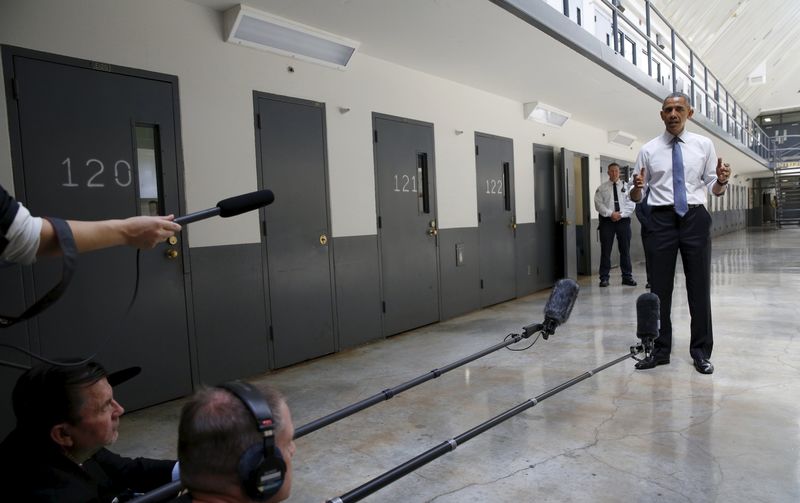By Julia Edwards
EL RENO, Oklahoma (Reuters) - President Barack Obama, who wrote in his memoir about using marijuana and cocaine as a youth, became the first sitting president to tour a federal prison on Thursday and met drug-offense inmates, saying he could have been in their place if not for the advantages he had growing up.
Obama spoke with inmates and toured El Reno federal prison, which holds 1300 inmates, 146 percent of its capacity.
He vowed to work with wardens and corrections officers to address overcrowding, a piece of his administration's wide-ranging criminal justice reform agenda.
Obama walked down the prison's dimly-lit gray halls and stood at the door of Cell 123, Block B, noticing its two occupants' sparse supplies: brown uniforms, mesh laundry bags, dish soap and a few books.
Six non-violent drug offenders shared their stories with Obama. Their discussions will air on HBO's "Vice" documentary program in September.
Speaking to reporters after their discussion, Obama reflected, "These are young people who made mistakes that aren't that different from mistakes I made."
"The difference is they did not have the support structure, the second chances, the resources that would allow them to survive these mistakes," he said.
More than 1.5 million Americans were in state or federal prisons at the end of 2013, according to the Bureau of Justice Statistics. African-Americans were 15 percent of the U.S. population at that time but accounted for about a third of its prisoners.
Obama wrote about his own drug use in his memoir "Dreams from my Father" and has made helping young black and Hispanic boys a priority of his remaining time in office through a program called "My Brother's Keeper."
The issue is one he has said he intends to remain committed to after he leaves office in 2017.
For the unprecedented visit, guards cleared prisoners from the building where Obama toured and spoke.
He said the criminal justice system should do a better job of discerning between young drug offenders from poor backgrounds and hardened, violent criminals.
"We have to consider whether this is the smartest way for us to control crime and rehabilitate individuals," Obama said.
NOT THE HARSHEST OF U.S. PRISONS
El Reno is a medium-security prison. David Fathi, director of the National Prison Project at the American Civil Liberties Union, said the visit would not show Obama the extent of overcrowding or lengthy stints in solitary confinement that exist at maximum-security prisons.
"He's not going to see the harshest and most restrictive and most problematic conditions in the federal prison system," Fathi said.
But, Fathi said, Obama deserves credit for being the first president to visit a federal prison and use his position to draw attention to the flawed system.
As his time in office begins to draw to a close, Obama has become more outspoken, while also enjoying a run of victories on Pacific Rim trade, his healthcare law, same-sex marriage rights and, earlier this week, a historic nuclear agreement with Iran.
Overhauling prison sentencing is an issue he has set as a key goal for his final months in the White House. On Tuesday, he called on the U.S. Congress to send him a sentencing reform bill by the end of the year.
Soaring U.S. incarceration followed a 1980s-1990s drug-crime crackdown. Mandatory minimum-sentencing guidelines from then would be altered under steps being considered in Congress for non-violent drug offenders.

The United States has 25 percent of the world's prisoners but just 5 percent of its population but has 25 percent of its prisoners.